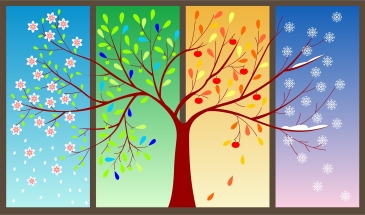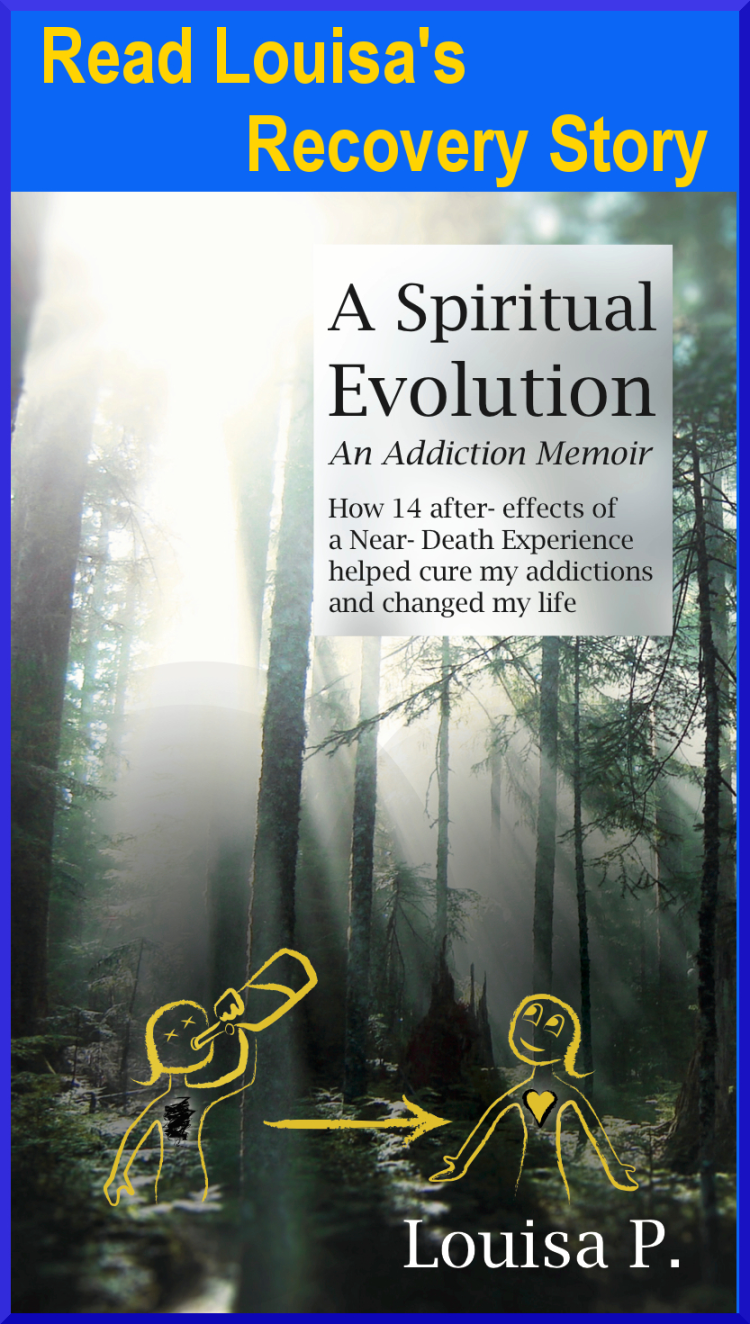Sobriety isn’t a task or a diet – it’s a way of life. And like life, it  has its ups and downs, riches and ruins. The quality of our sobriety varies with our connectedness to god and our fellows, depending on the rigor with which we cultivate both. Many of us long to be gung-ho about sobriety all the time – and we can be! It’s just that what gung-ho looks like is going to change over time, which is why I like the analogy of seasons in sobriety.
has its ups and downs, riches and ruins. The quality of our sobriety varies with our connectedness to god and our fellows, depending on the rigor with which we cultivate both. Many of us long to be gung-ho about sobriety all the time – and we can be! It’s just that what gung-ho looks like is going to change over time, which is why I like the analogy of seasons in sobriety.
Among my AA speaker recordings, I particularly love one by Don C., a Native American from Colorado Springs sober since August 10, 1978. Don describes the horrific beating his alcoholism inflicted, distrust at his first AA meeting, a sponsor who made him read and annotate each Big Book chapter 25 times, and the freedom he accessed (there’s a silence while he fights back tears) by working the 12 steps. His entire life and outlook changed. So why, early in his fourth year sober, did he suddenly find himself miserable?
He says:
“I was about three years and two months sober and everything was going to hell. Meetings got stupid; my sponsor was having stupid attacks; the Big Book sucked… I thought I was going crazy. So I went up to see Johnny Looking Cloud… He was a Native Elder that was in recovery. …He said, ‘You’re thinking this is a white man’s program – and it’s not. This is the Indian way, also… The steps are 12 gentle ways to bring you back to the original teachings. And when you’re done, you’ll be in harmony… the way it was for your ancestors.’”
Johnny Looking Cloud explains to Don, firstly, that the steps align with the Native teaching of the Four Directions. Steps 1, 2, and 3 align with the east, direction of the new sun, where we find our relationship with the Creator. Steps 4, 5, and 6 align with the south, the high sun, where we find our relationship with ourselves. Steps 7, 8, and 9 align with the west, the setting sun and direction of letting go, where we make amends to heal our relationships with others. To the north, like the North Star, lie 10, 11, and 12, steps that align with the elders’ teachings to deepen our wisdom.
Secondly, he explains that just as all living things proceed through cycles, so do we in sobriety. The first year is our spring, when our sap begins to flow and we form buds of potential. In the summer of our second year, our leaves mature and we bloom – living vigorously in sobriety. By the autumn of our third year, we’re harvesting sobriety’s fruits – stability, material gain, relationships. But then along comes that fourth year: winter. Our leaves wither and drop; the light weakens; sobriety seems barren and empty, as if everything were falling apart – just as Don C. experienced. But in truth, the slate is only being cleared for a new level of sobriety – a fresh spring.
My own seasons haven’t conformed to a four-year pattern, but I’ve definitely experienced that cycle many times in my 21 years’ sobriety. In my springtimes, I get to see something new, some truth of living or character defect I’d never recognized before, that changes me forever. My golden summers and autumns extend sometimes for years.
But winter does arrive. And it sucks. My sobriety feels ~meh! ~ I can’t recapture my enthusiasm for meetings, stepwork, or service. Even so, I’ve schlepped through many such winters to reach new springs. How does that happen… or not happen?
All of us, consciously or not, seek god/goodness/love in our lives. All of us carry burdens of fear, pain, and loss. The interrelationship between these two parts, I’ve found, comprises the melody of my life. The seasons of a heavy and aching soul complement those of lightness and a free spirit.
My feelings really don’t have much to do with god, I don’t think. Emotions are part of me, rooted in my body and brain – my separateness from god. Rather, the godly part of me manifests only in my immediate awareness – my ability to see with love in the present instant.
During my summery months, my god-awareness acts like a beam of light, one I can turn on my own emotions – fears and sadness or childish excitement. I can make friends with whatever nonsensical feelings insist on tagging along with me. And when I’m good with my own emotions, it’s easy to extend love and compassion to others.
But when sobriety’s winter comes around, the beam wanes so I can’t tell what the hell’s going on. Emotions victimize me. I suffer. I isolate. I envy. I doubt life will ever be good again.  It’s at this point that I’m most vulnerable to the wheedling voice of alcoholism. It promises me drinking would fix everything. It points out that other people drink with impunity, claims my life would be more fun if I joined them. It paints a sweeping mural of a happier me with booze at its center.
It’s at this point that I’m most vulnerable to the wheedling voice of alcoholism. It promises me drinking would fix everything. It points out that other people drink with impunity, claims my life would be more fun if I joined them. It paints a sweeping mural of a happier me with booze at its center.
For me, thank god (literally), this voice stays puny – I can swat it away like a pesky fly. But for relapsing friends of mine, it begins to sound credible. “Take charge of your life!” it urges them. Humility starts to look like timidity; gratitude like settling; forgiveness like self-debasement. Before they know it, a grandiose ego has upstaged god and they’re gonna to fix themselves with a drink – and do it right this time!
I wish I could offer a ticket to instant spring. But there isn’t one. There’s only acceptance:
 This, too, shall pass. Every alcoholic with long term sobriety has taken refuge in this motto. When recovery feels like drudgery, we still pursue it as best we can – going to meetings, calling sponsors, being of service. Maybe we seek out Johnny Looking Cloud, or our own equivalent, and ask for help. In some ways, those words represent the deepest form of faith. They capture the willingness to have no idea how things will turn out, yet trust god enough to hang on through the darkness, believing spring will come again.
This, too, shall pass. Every alcoholic with long term sobriety has taken refuge in this motto. When recovery feels like drudgery, we still pursue it as best we can – going to meetings, calling sponsors, being of service. Maybe we seek out Johnny Looking Cloud, or our own equivalent, and ask for help. In some ways, those words represent the deepest form of faith. They capture the willingness to have no idea how things will turn out, yet trust god enough to hang on through the darkness, believing spring will come again.
![]()
.
PS: Listen to Don C. here. This isn’t the same talk I have on my 2011 Bellevue CD, but close.
![]() .
.
.
.





Thank you Louisa. Beautiful post. It helps me understand. 🙂 Thank you.
xx, Feeling
LikeLiked by 1 person
Thanks Louisa. With 14 months of continuous sobriety tomorrow, I know my winter time will come. When it does, I will certainly remember these words, and reach deeply into the memories of my springtime-one day at a time.
LikeLiked by 1 person
Go, Mike! Happy 14 months! You (and god) got this! 🙂
LikeLike
Thank you Louisa. I’m always amazed at your depth, and feel fortunate knowing you.
Mick
LikeLike
Thanks, Mick. Likewise. 🙂
LikeLike
I appreciate the analogy, depth & thoughtfulness of your writing.
LikeLike
Thanks, Karen! I appreciate your kindness in telling me so.
LikeLike
I feel warmer, thanks😍
LikeLike
Do you have any contact for Don C. I am Mike D and am the Co Chair and Speaker Chair for the 2020 Pass it On roundup in May located in Bozeman MT.
I would like to speak with him about being a speaker for this event.
Thank you
LikeLike
Try here – Don Coyhis is the president and founder of White Bison, Inc. – a sobriety organization geared toward Native Americans. Please tell him how much I admire him!
http://www.whitebison.org/
LikeLike
Thank you for your thoughts on winter. I too heard Don a few years back & thankfully remembered his reference to “seasons of sobriety.” It’s good to know I’m not alone…
LikeLiked by 1 person